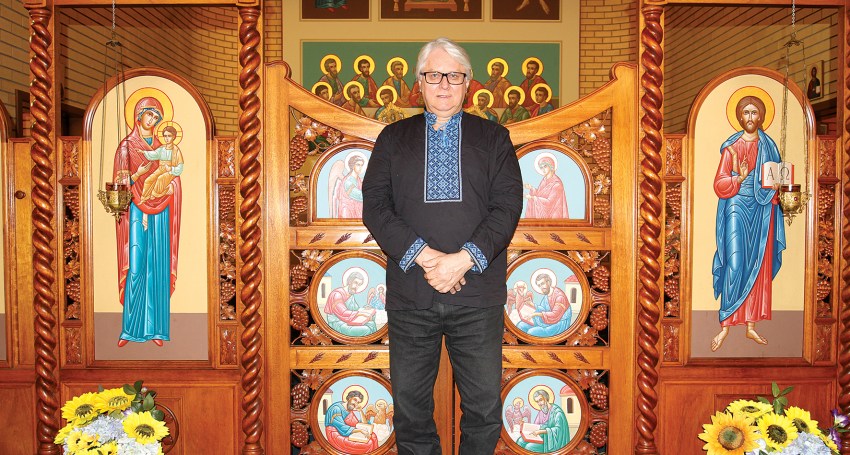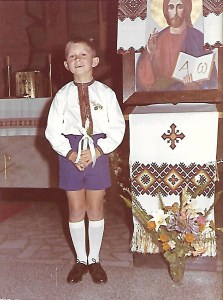Keeping the faith of his forebears
People
For Bohdan Lapka, the Ukrainian Catholic faith is part of his DNA.


A young Bohdan at his First Communion.
The only child of immigrant parents who fled Russian-occupied Ukraine after World War II, Bohdan is a stalwart of the Ukrainian Catholic Parish of Wayville.
He was heavily involved in the parish’s recent 50th anniversary celebrations and compiled a history of the creation of the parish and the building of Our Lady of Protection Church where he has worshipped since he was a teenager.
Whether it’s serving on the parish council, photographing feast days or helping to make varenyky (dumplings) in the hall for lunch after Mass, Bohdan is committed to carrying on the faith and cultural traditions of his deceased parents.
Dressed in his Ukrainian embroidered shirt, 65-year-old Bohdan proudly pointed to the dome, icons, stained glass windows and other architectural features of the Wayville Church.
He recalled his own contribution – designing the iconostas and helping install icons in the church and in the wooden screen in front on the altar – and that of other younger members of the Ukrainian Catholic community back in the 1980s.
“All of us young people who were kids of the first immigrants were involved in helping to decorate the church…an iconographer from New York came here and we helped him put the icons in place. Others put in the pews made by a Ukrainian carpenter, the banners were embroidered by mothers and grandmothers, the nuns were involved as well,” he said.
Bohdan’s grandmother Maria was a major influence on his life. She came to Australia in the early 1960s after 15 years in a labour camp in Siberia. The family located her through the Red Cross and brought her to Australia where she lived with the family in Dunks Street, Parkside.
She never learnt English but got by with a few words – enough to be able to catch a bus and walk Bohdan to and from school.
Advertisement
“My grandma was very religious, she’d be praying every day, the Rosary at home, in the garden or in church when there was any liturgy or feast day,” he said.
Bohdan said he could have done what a lot of people do once their parents die or even when they are still alive and stop going to church.
“I could have made excuses not to go to church but it was part of my identity, not just being Ukrainian but also being Ukrainian Catholic,” he said.
“Even when I’m travelling I always pop into a church, not just to look at it but to pray, you know thank God that I’ve managed to arrive safely and hopefully will get home safely.”
With his godfather a Ukrainian priest who Bohdan’s father met when he was in a prisoner of war camp in Rome, there was added incentive for him to uphold the faith, which included being an altar server in his younger years.
Advertisement
But there was also the social aspect as he and other young people attended Ukrainian School at Hindmarsh every Saturday, learnt traditional dancing, played in bandura ensembles and became members of the Ukrainian scouts.
Originally the family worshipped at St Patrick’s Church and Bohdan recalled his parents walking and pushing him in a stroller from Parkside to Grote Street.
He attended the local Catholic school, St Raphael’s, and then Christian Brothers College where one of his Year 12 subjects was the Ukrainian language.
After studying interior design at university, Bohdan worked briefly as a draughtsman and at Telecom. But for the bulk of his career – 33 years – he worked as a supervisor at the Adelaide Casino. His initial concerns about working in the gambling industry were allayed by his father who told him “you have a family to provide for, you can still go to church and pray any time, it doesn’t mean you have to give up your faith”.
Bohdan said his philosophy was to follow the Gospel message of “love your neighbour” and treat people as he would want to be treated.
Since leaving the Casino he has worked at the San Giorgio La Molara Community Centre at Payneham where he enjoys serving tables and working behind the bar.
Through his work at the San Giorgio Centre he has connected with the local Rotary club which holds its meetings there and has been involved in their fundraising efforts for projects in war-torn Ukraine. The Wayville parish supports two orphanages in Ukraine and has also hosted Australian humanitarian Maurice O’Connell, from Emmaus parish, who is currently working for a local charity in Odesa. Bohdan presented Maurice with a t-shirt featuring Ukrainian embroidery.
In another show of solidarity with the Ukrainian people, he organised for the stobie poles in the street next to Our Lady of Protection Church to be painted the national colours of blue and yellow.
Bohdan said some of the refugee families who have come to Adelaide from Ukraine in recent times have joined the two Ukrainian Catholic churches at Wayville and Woodville.
But like many religious and community organisations, the numbers are dwindling and it’s a challenge to find people willing to commit to volunteering on a regular basis.
For the first wave of immigrants, participation was all about keeping the community together and Bohdan said many of them, including his parents, had initially planned to return to Ukraine at some stage.
Bohdan’s mother escaped to Czechoslovakia during the war with her sister and baby niece while his father, who was in the army, ended up in an English prisoner of war camp near Rome.
“Ukrainians had to deal with Nazis on one side and Russians on the other (during the war),” Bohdan said.
His father Myron commenced studies for the priesthood while in Rome but didn’t continue. He met Olga who he married in St Patrick’s Church in Adelaide after she arrived here, via Canada. Her sister and her family had chosen to settle in the USA. Myron worked for the railways as a train porter and then completed his Bachelor of Arts at Adelaide University and became a librarian at the State Library.
Bohdan said by the time Ukraine gained independence in 1991, his parents had been here for more than 40 years and Adelaide was their home.
“I am thankful my parents decided to settle here in Adelaide where I was born and raised. They maintained their faith, language, customs and traditions and instilled in me those values and love for their Ukrainian background,” the father of two said.
“I’m proud of my rich heritage and faith which in turn I am able to pass onto my daughters and grandchildren.”











